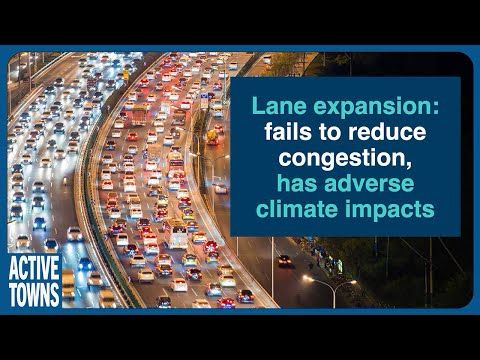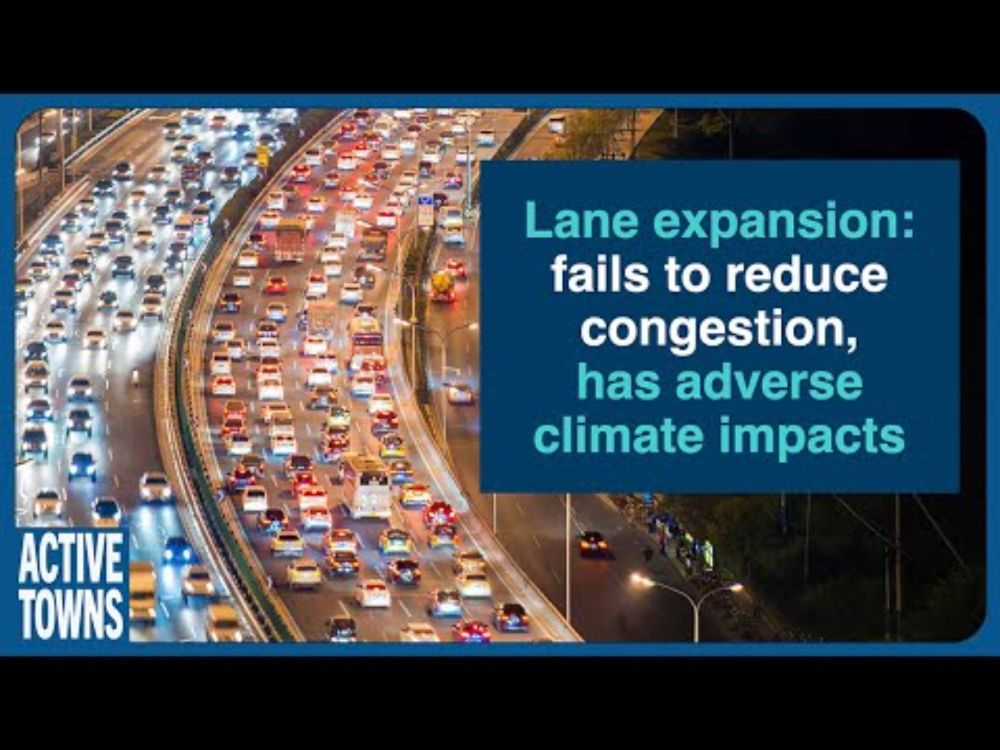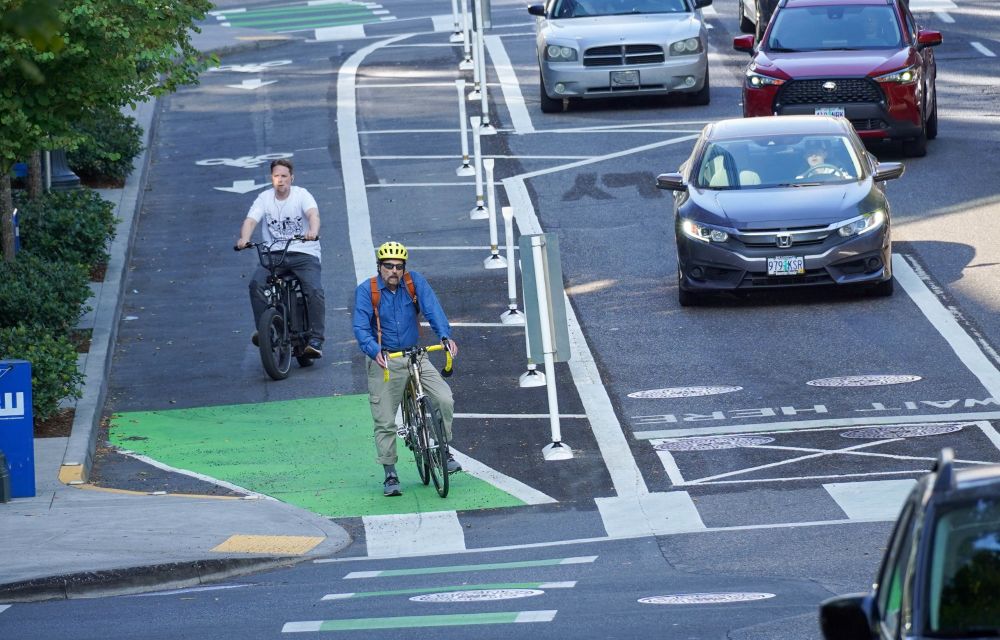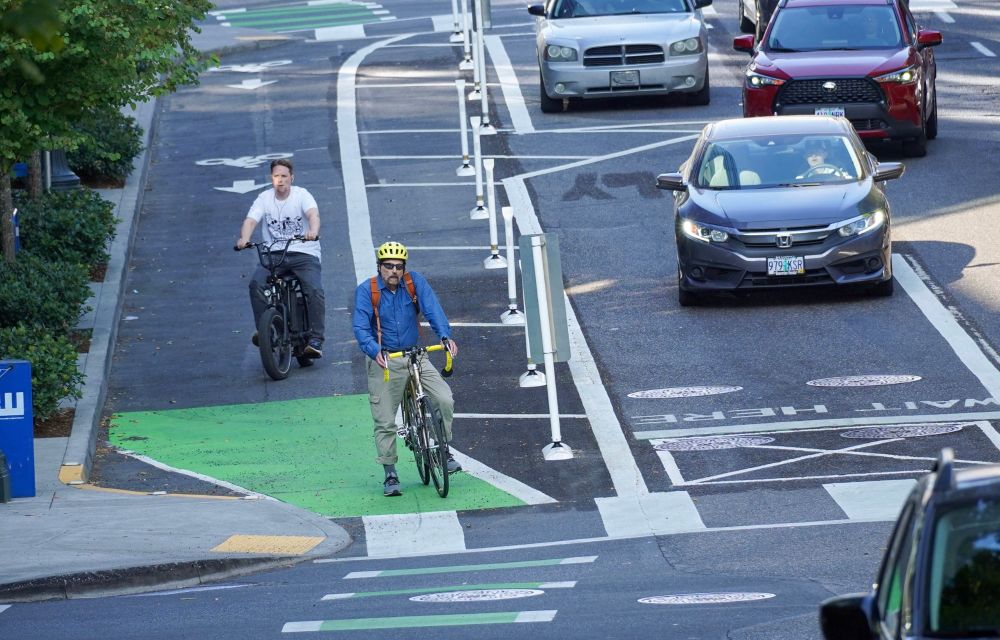RMI will be at #ClimateWeekNYC to highlight the market-based solutions and strategies that drive the world’s transition to more efficient, cost-effective, and secure clean energy options, both locally and globally.
We hope to see you there! https://bit.ly/4mkGwmT
17.09.2025 01:52 — 👍 2 🔁 1 💬 0 📌 0
In both cases, the trend is clear:
"Economic outcomes improve as a transportation system becomes more multimodal and efficient"
Full report here:
www.vtpi.org/ITED_paradox...
23.06.2025 20:57 — 👍 0 🔁 0 💬 0 📌 0
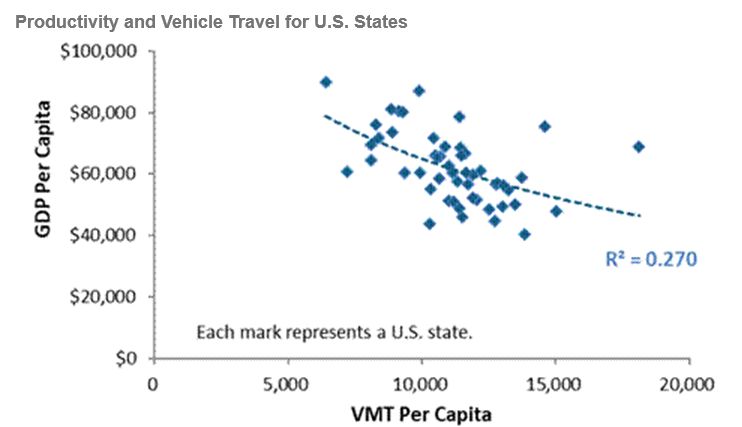
I'll definitely be citing this work going forward.
Also interesting but with a slightly lower R2 (explanatory usefulness) value is this plot of VMT per capita vs GDP per capita.
23.06.2025 20:57 — 👍 0 🔁 0 💬 1 📌 0
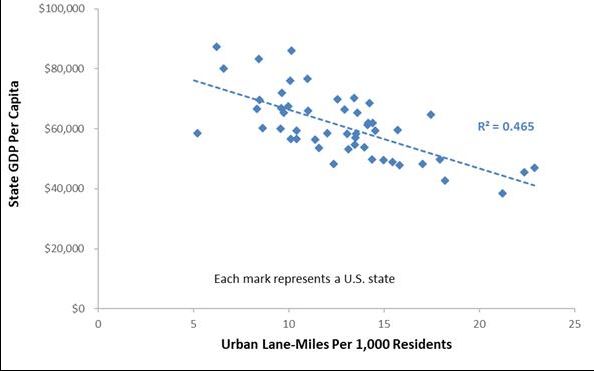
Economic productivity declines with more urban roadway supply. This indicates that urban roadway expansions are often economically harmful because they degrade other types of travel, particularly walking, and they induce inefficient vehicle travel and sprawl.
State economic productivity DECLINES when you choke metro areas with highways!
Check out this plot of 1) urban lane miles per capita vs. 2) state GDP per capita
From @toddlitman.bsky.social and his team at VTPI
23.06.2025 20:57 — 👍 0 🔁 0 💬 1 📌 0
This is what great public service looks like! Thank you @nharris.bsky.social for promptly addressing this concern
18.04.2025 18:38 — 👍 1 🔁 0 💬 0 📌 0
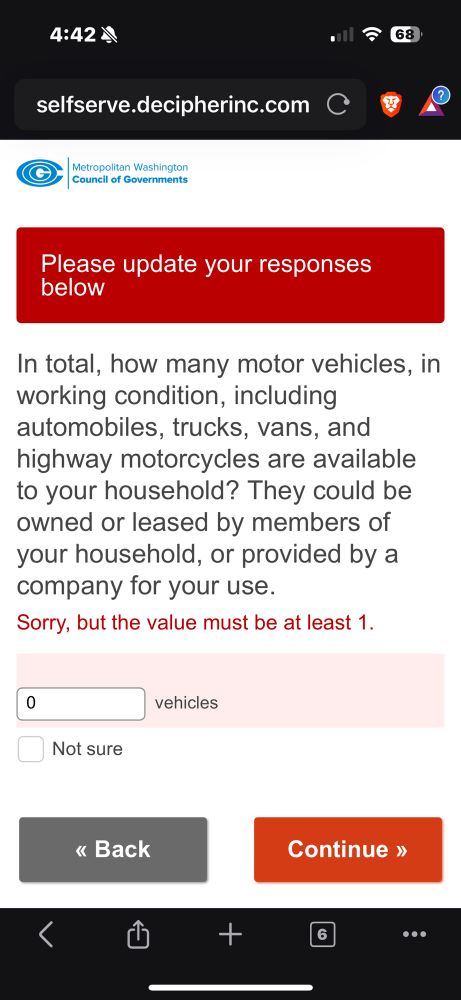
Carbrain survey alert: the MWCOG survey won’t let me enter that my household has 0 vehicles - potentially stuffing the ballot box for more car infrastructure when I really moved to DC for the mass transit 🚆 🚎 🚴♂️
@cmcharlesallen.bsky.social
@nharris.bsky.social yall should toss this data point
31.03.2025 20:50 — 👍 1 🔁 0 💬 4 📌 0
YouTube video by Active Towns
EP 274 MIGUEL MORAVEC: Is Induced Demand A Kitchen Table Issue? If not? Can it be?
Spot on as always by @activetowns.bsky.social and guest @miguelmoravec.bsky.social from Rocky Mountain Institute youtu.be/3aMNC8Bm4fA
23.12.2024 16:11 — 👍 2 🔁 1 💬 1 📌 0
A good one to listen to!
08.01.2025 20:42 — 👍 1 🔁 1 💬 0 📌 0
Join me and John Simmerman TODAY at 2pm ET for a great clean transport dialogue!
18.12.2024 18:18 — 👍 1 🔁 0 💬 0 📌 1
YouTube video by Active Towns
EP 274: Discussing Induced Demand and much more w/ RMI's Miguel Moravec
PREMIERE REMINDER: Pls tune in tmw, Wed, Dec 18th, at 2 pm EST for my chat w/ @miguelmoravec.bsky.social, a Senior Associate w/ the @rockymtninst.bsky.social (RMI), about strategies to create more sustainable mobility mode choices, such as walking, biking, and transit.
youtu.be/3aMNC8Bm4fA
17.12.2024 22:39 — 👍 8 🔁 1 💬 0 📌 1
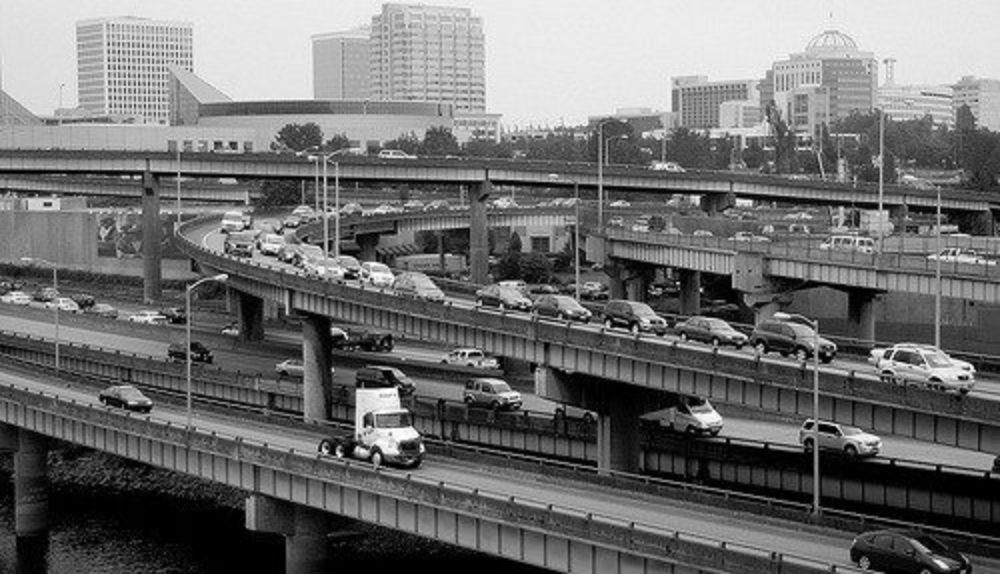
Opinion: Cars Have F@#%ed Up This Country So Bad — Streetsblog USA
Fact: The car-centric age of development is one long mistake.
"It is like building a staircase that takes up the entire first floor of a two-story house. You have left yourself nowhere to live."
Thank you for voicing this feeling @hamiltonnolan.bsky.social
usa.streetsblog.org/2024/09/10/o...
03.12.2024 18:37 — 👍 0 🔁 0 💬 0 📌 0
@hthonet @drewveysey does this consider the new proposed guidance from IRS that charger credits will be awarded by the ~port~ rather than by the ~station~?
I suspect that new discount could be a significant tie breaker
22.10.2024 18:21 — 👍 0 🔁 0 💬 0 📌 0
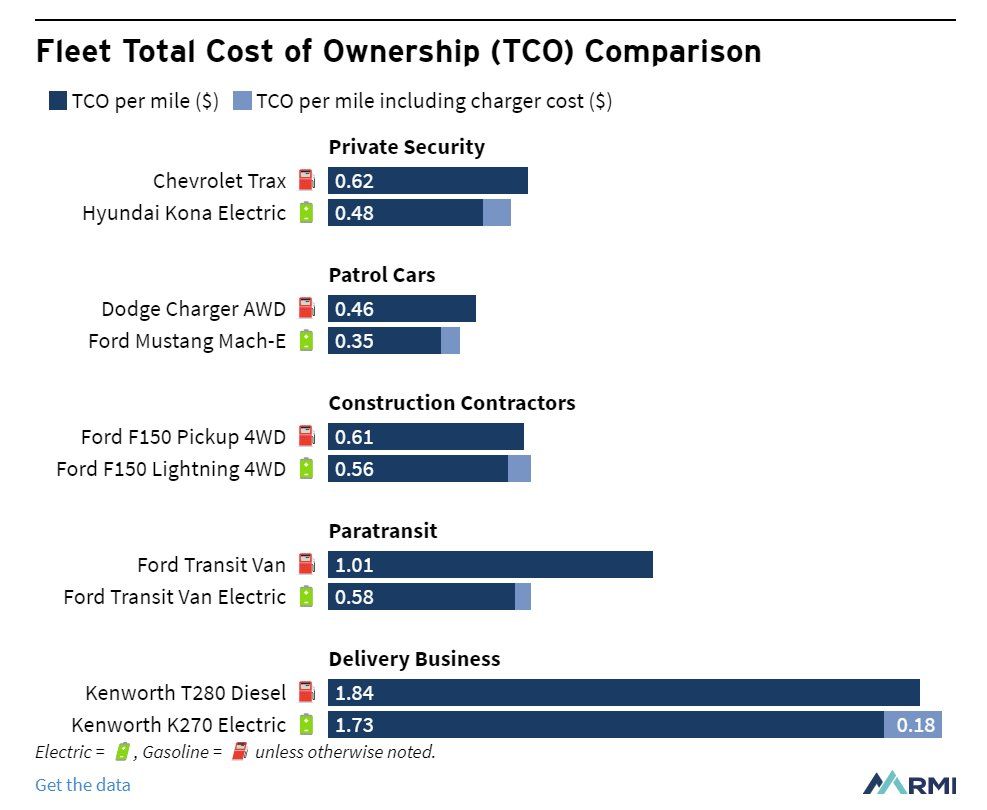
Extra extra: Check out our new fleet TCO analysis -
EV vs ICE!
Common fleet applications!
Charger costs included!
By the venerable @hthonet @drewveysey
https://rmi.org/businesses-and-local-governments-its-never-been-a-better-time-to-electrify-your-vehicle-fleet/
22.10.2024 18:19 — 👍 0 🔁 0 💬 1 📌 0
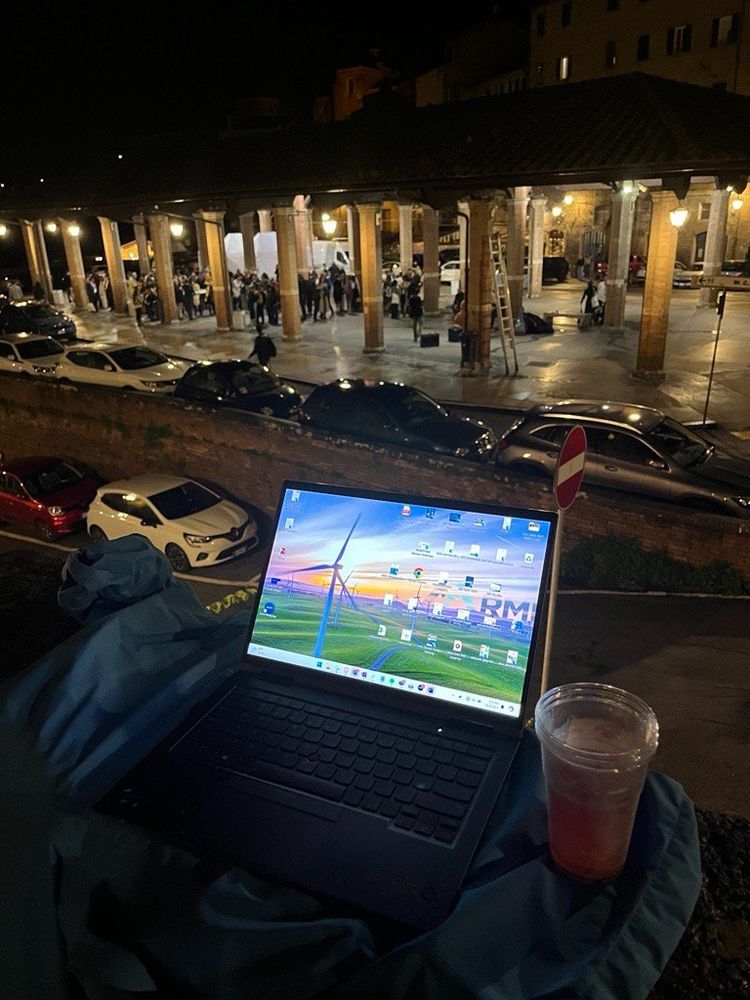
Disclaimer: today's live tweets were sent while traveling for an urbanism conference in Italy, so I blame any omissions on the complimentary event spritz
09.10.2024 00:18 — 👍 0 🔁 0 💬 0 📌 0
Electric car use by country - Wikipedia
And no, sadly EV's still aren't prevalent enough to put a dent in this (~2% veh stock in 2024).
End rant, do better, have a nice day!
https://en.wikipedia.org/wiki/Electric_car_use_by_country
09.10.2024 00:18 — 👍 0 🔁 0 💬 1 📌 0
...meaning that pollution in 2024 is way higher than what's forecast here and likely increasing.
@MnDOT should correct this trendline to bake in the emissions from post pandemic driving.
Gee - please don't let them set targets around that forecast TAC!
09.10.2024 00:18 — 👍 0 🔁 0 💬 1 📌 0
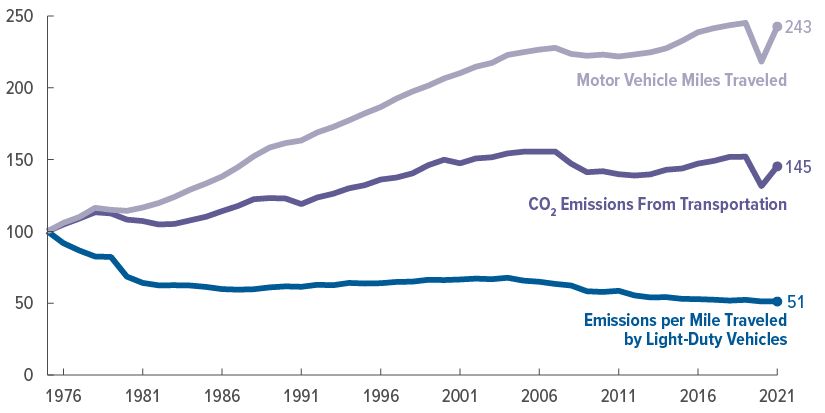
Anyone in the biz could tell you @MnDOT is lowballing the BAU forecast with that 2020 trend line
Why? Per @USCBO, national VMT (and thus pollution) rebounded almost immediately to pre-demic levels in 2021
Folks who've driven in the 3 yrs since know that traffic has only grown..
09.10.2024 00:18 — 👍 0 🔁 0 💬 1 📌 0
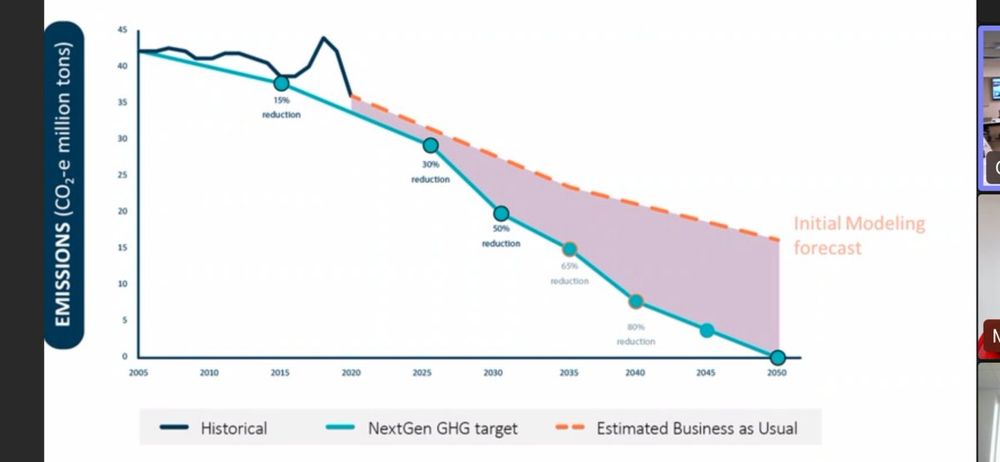
BONUS RANT: This GRAPH that MnDOT presented
Spot the bizarr-o assumption!
09.10.2024 00:18 — 👍 0 🔁 0 💬 1 📌 0
Ok that's a wrap! Coming up next time:
1) 18 pages of glorious guidance on how to assess highway VMT/GHG!
2) brand spanking new regional target allocations (Duluth MnDOT's coming for ya!)
3) a hybrid forecast system that weighs SHIFT(!) and TDFM outputs! @CaltransHQ u listening?
09.10.2024 00:18 — 👍 0 🔁 0 💬 1 📌 0
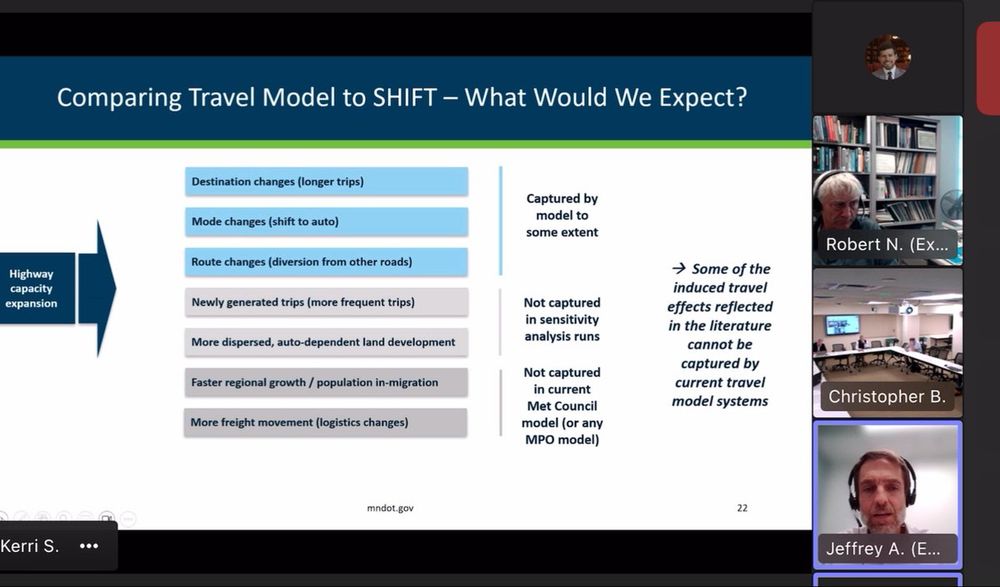
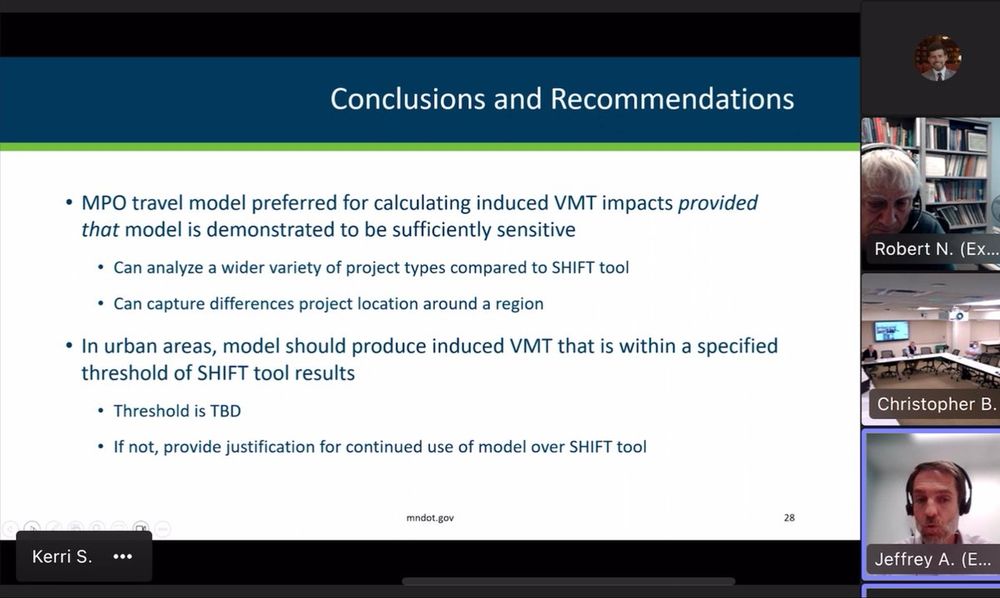
This conversation was informed by some awesome sensitivity analysis from @ICF comparing TDFM's and SHIFT in real world settings, leading them to the conclusion to recommend SHIFT adherence in all urban settings.
09.10.2024 00:18 — 👍 0 🔁 0 💬 1 📌 0
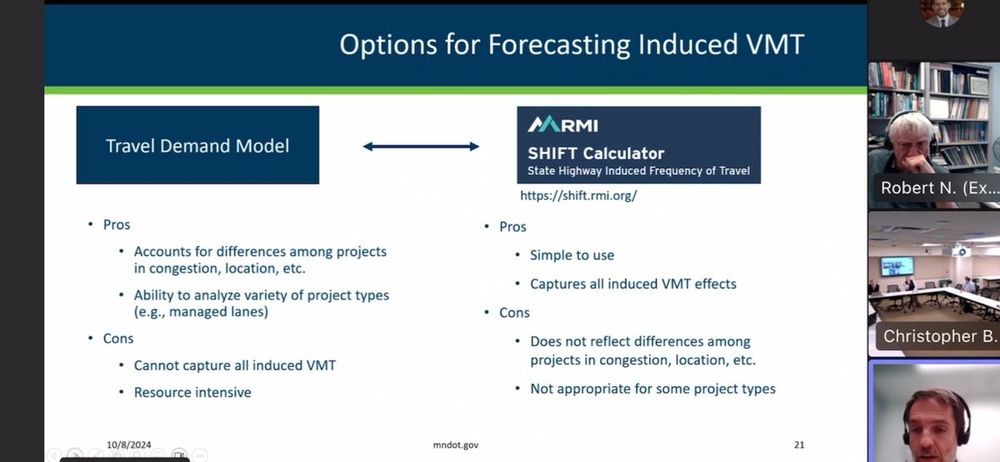
TAC members - if you're listening - please consider requiring forecast validation with SHIFT as a firm part of the analysis process!
Its right and its free! It doesn't get any better than that.
09.10.2024 00:18 — 👍 0 🔁 0 💬 1 📌 0
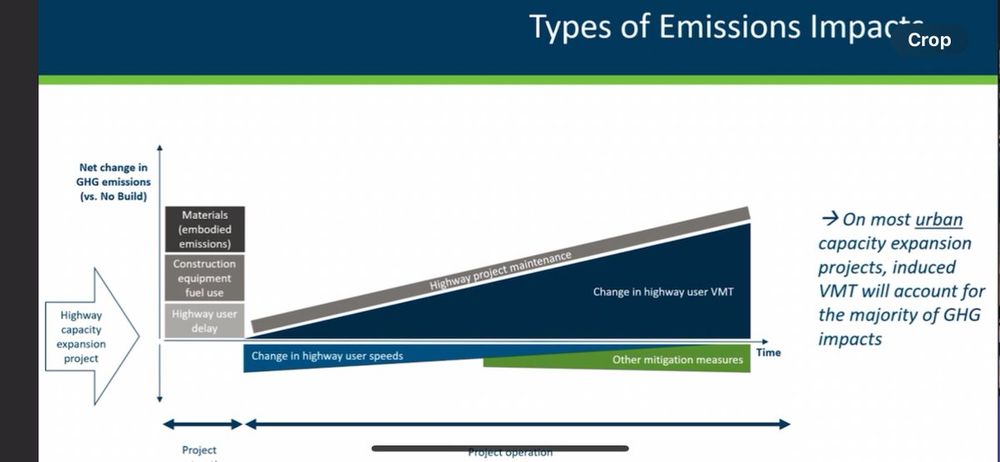
As an @RockyMtnInst analyst, I can tell you that the SHIFT very robustly captures new tailpipe pollution from expansion based on real observed outcomes.
Requiring forecasts to be even somewhat near SHIFT entirely blows up the junk idea that expansions can decrease GHG
09.10.2024 00:18 — 👍 0 🔁 0 💬 1 📌 0
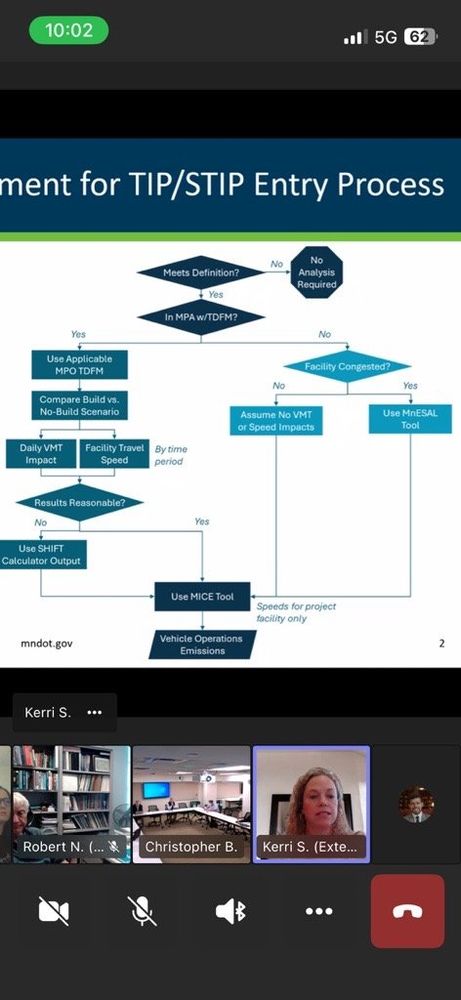
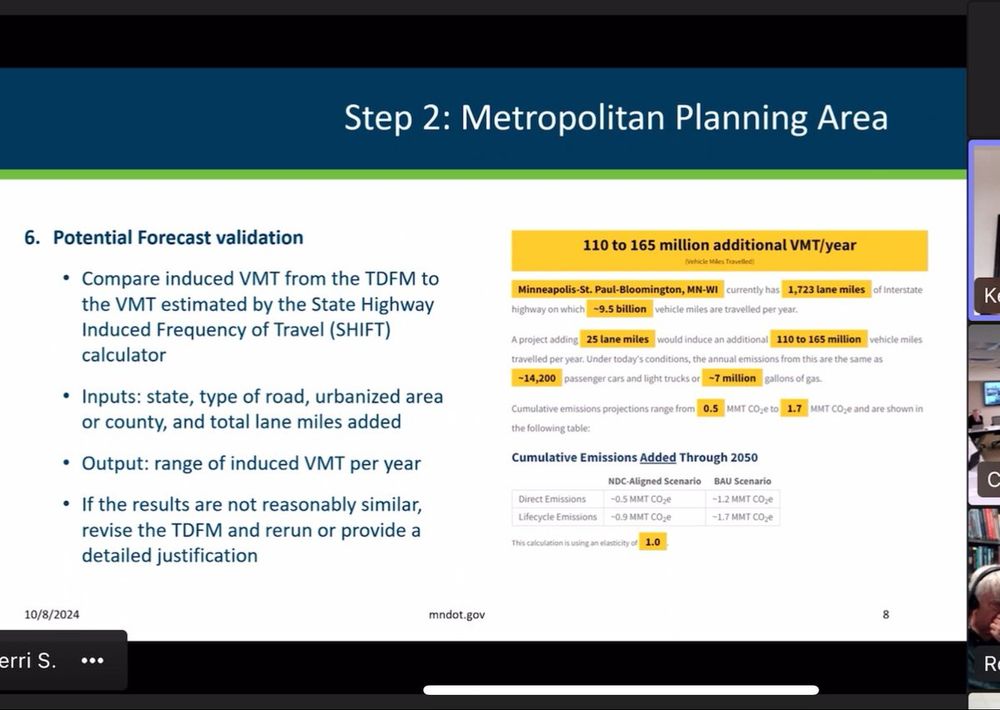
Fortunately, @ICF had this flow chart of how MnDOT would like to handle modeling to better address junk input.
Most welcomely, the slides suggested comparing TFDM results to @RockyMtnInst's peer-reviewed SHIFT Calculator to see if forecasts are "reasonable"
This is HUGE!!!!
09.10.2024 00:18 — 👍 0 🔁 0 💬 1 📌 0
Today, transport modeler @NormMarshall also pointed out the systemic failure of static travel demand models to have any basis in reality.
He directly called out that the twin cities TDFM doesn't even consider land use, which is a huge L-take for a 21st century metro region
09.10.2024 00:18 — 👍 0 🔁 0 💬 1 📌 0
Part 3) not junk travel demand models!
You may remember my last live-tweet thread where I addressed the usage of junk VMT forecasts head on:
https://x.com/MiguelMoravec/status/1833272245826777416
09.10.2024 00:18 — 👍 0 🔁 0 💬 1 📌 0
The regional target options + modeling used to allocate the targets will be shared at the next TAC meeting.
Rooting for MnDOT to have used @VolpeUSDOT 's Vision Eval model, which is free, open source, and has a great fix on land use + induced demand
09.10.2024 00:18 — 👍 0 🔁 0 💬 1 📌 0
An interesting stat: smaller MPOs really only have about 1 project/yr that would be affected by the VMT/GHG requirements.
These projects are usually developed with heavy MnDOT consultation anyway, meaning that the assessment would add minimal burden for rural planners
09.10.2024 00:18 — 👍 0 🔁 0 💬 1 📌 0
Part 2) Regional Target Setting!
MnDOT shared that the TAC will have the opportunity to weigh in on what is fair target setting for rural vs urban areas, understanding that each region will have different levers to pull to hit decarb.
09.10.2024 00:18 — 👍 0 🔁 0 💬 1 📌 0
housing + environmental health.
Asst. Professor of urban planning @gsd.harvard.edu
Formerly OECD, Paris planning, Ad’A ~
i write i teach i build i deconstruct
www.magdamaaoui.com
currently working on hospitals x housing, any lead/personal story welcome
End car dominance and save the planet one direct action at a time. Likes: bus lanes, bike routes. Dislikes: cops, the petrostate
🌎Unceded Ohlone Land (SF)
safestreetrebel.com
I am a transport and land use policy analyst. I love doing research about ways to make communities healthier, wealthier and wiser at the Victoria Transport Policy Institute (www.vtpi.org)
Gaithersburg MD City Council.
Vice Chair, Transportation Planning Board of the Metropolitan Washington Council of Governments.
Board gamer and sci fi reader.
https://voteforneil.com
Dad, husband, Ward 6 DC Councilmember, Chair of the Committee on Transportation and the Environment.
Vice Chair of Metropolitan Washington Council of Governments.
charlesallenward6.com
Posts by CM Allen & staff
Organizing to build the public good. Fast trains, low utility bills, protect public workers, safe tech and more. Get on the bus 🚌
Strategic comms leader in clean energy.
4th book -- about women farmers shaking up the field -- out Sept. 2025 with Simon & Schuster 📕
Energy policy in states. Conflict and facilitation nerd. Sustainability ninja. Music, art, writing too. From Detroit, based in DC.
Manager in RMI's Clean Regional Economic Development initiative. Non-resident fellow at United States Studies Center, Sydney University.
Mostly lurking for takes on industrial policy, clean energy, and economics.
Associate at RMI working on economic development and cleantech manufacturing. The usual caveats apply. Here for the #EnergySky.
🏙️🚶🏾♂️🚍🚏🚇🚲💪🏾🏳️🌈 (He/Him) Queer Urbanist - Transit Professional - Transit Nerd - Community Connector
Interests: Cities, Cycling, Walking, Architecture, Museums, Performing Arts, Trains, Buses, People
All views are mine.
https://www.instagram.com/jahorne
I do development at Fervo
Decarbonizing Electricity @rockymtninst.bsky.social ⚡️ Also: 🏃🏾🚲 🏀 ☀️ (he/him)
RMI transforms global energy systems through market-driven solutions to secure a prosperous, resilient, clean energy future for all.
Father of four: 3 kids and BikePortland.org - https://bsky.app/profile/bikeportland.org 🚲 - North Portlander.
Ezra Klein’s tweets, articles, clips and podcasts on Bluesky.
I’m not in James Thurber’s attic any more! right now I’m home yay ! I’m the one who writes this column https://www.theatlantic.com/author/alexandra-petri/ and loves puns
Minnesota guy.
"This particular activist will not stop." Sen. Chris Murphy
Congressman, former Mayor of Long Beach, educator, comic nerd, progressive & proud American 🇺🇸🏳️🌈




